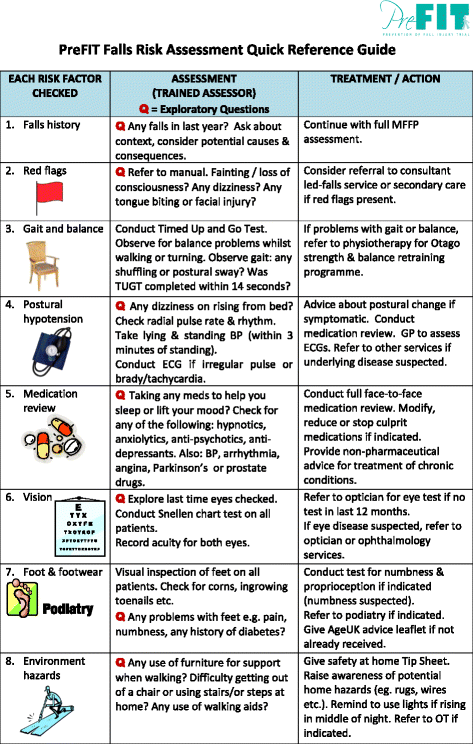Little Known Facts About Dementia Fall Risk.
Little Known Facts About Dementia Fall Risk.
Blog Article
Fascination About Dementia Fall Risk
Table of ContentsOur Dementia Fall Risk DiariesThe 5-Minute Rule for Dementia Fall Risk4 Easy Facts About Dementia Fall Risk ExplainedFacts About Dementia Fall Risk RevealedSome Ideas on Dementia Fall Risk You Should Know
You might be anxious due to the fact that you've had a fall before or because you have actually seen you're beginning to really feel unsteady on your feet. You may have seen adjustments to your health and wellness, or just really feel like you're reducing a little. Whatever the factor, it isn't uncommon to become cautious and shed self-confidence, and this can stop you doing things you used to do and make you feel more isolated.If you have actually had a loss or you have actually begun to feel unsteady, inform your physician also if you feel great or else. Your medical professional can examine your equilibrium and the way you walk to see if renovations can be made. They might have the ability to refer you for a drops threat analysis or to the drops prevention service.
This information can be acquired through interviews with the person, their caregivers, and an evaluation of their clinical documents. Begin by asking the private regarding their history of falls, including the regularity and circumstances of any current drops. Dementia Fall Risk. Ask about any flexibility issues they might experience, such as unsteady or difficulty walking
Conduct a comprehensive review of the person's drugs, paying particular interest to those known to raise the danger of drops, such as sedatives or drugs that reduced blood pressure. Determine if they are taking several medicines or if there have been current changes in their medicine routine. Assess the individual's home atmosphere for possible hazards that can enhance the danger of falls, such as inadequate lighting, loosened carpets, or lack of grab bars in the restroom.
The 20-Second Trick For Dementia Fall Risk
Guide the individual with the loss threat assessment form, explaining each concern and taping their feedbacks properly. Compute the total risk score based on the responses provided in the assessment form.
Frequently keep an eye on the individual's progress and reassess their threat of falls as needed. Provide ongoing education and learning and assistance to promote safety and security and minimize the risk of falls in their daily living activities.
Many research studies have revealed that physical treatment can help to minimize the danger of dropping in grownups ages 65 and older. In a brand-new research study (that took a look at drops danger in females ages 80 and older), scientists computed the financial impact of picking physical treatment to stop drops, and they discovered that doing so conserves $2,144, including all the hidden expenses of your time, discomfort, missed out on life events, and the bucks paid for services.
The Only Guide to Dementia Fall Risk
Checking your heart rate and blood stress dimensions at remainder and while you transform positions (from sitting or existing to standing). A basic test of your thinking (cognitive) capacities. Assessing your balance, stamina, and strolling capability. A basic vision examination. Assessing your feet and shoes. A home safety assessment. Based upon the examination results, your physical specialist will create click here for more a plan that is tailored to your specific requirements.
Older adults that have trouble strolling and talking at the very same time go to a higher risk of falling. Dementia Fall Risk. To assist boost your safety and security throughout day-to-day tasks, your physiotherapist may develop a training program that will challenge you to keep standing and walking while you do one more task. Examples include walking or standing while counting backward, having a conversation, or bring a bag of groceries
Your physiotherapist likewise can determine which activities you must avoid to stay safe. Community-based drops prevention programs assist people to: Decrease their worry of falling. Establish objectives for enhancing their physical activity. Make their homes much safer. Work out more to boost their stamina and equilibrium. These programs commonly are led by volunteer instructors.
Some Known Factual Statements About Dementia Fall Risk

Measles, or rubeola, is a very contagious, acute viral infectious disease brought on by the measles infection. Some people assume of measles as simply a breakout and high temperature that cleans up in a couple of days; nonetheless, measles can create significant wellness complications, especially in kids more youthful than 5-years-old. The most effective defense versus measles is the measles, mumps, and rubella (MMR) injection.
Autumns are an usual cause of injury among older adults.
Dementia Fall Risk Can Be Fun For Everyone

She has a case history of seizure disorder and high blood pressure. She is obtaining an IV mixture and taking Gabapentin and Lasix. her comment is here She has no history of drops, her gait is stable, and she nullifies with no concerns. The previous nurse states that she calls for aid to the shower room when she needs to go.
Instances of common loss interventions/measures consist of: Guaranteeing a patient's crucial products are available. Placing the client's bed rails up with the alarm system on. Helping a person while they're standing up from bed. Beyond recognizing exactly how to make use of the Johns Hopkins Autumn Threat Evaluation Device, it is essential that centers include its use right into a much more thorough fall avoidance plan.
Report this page